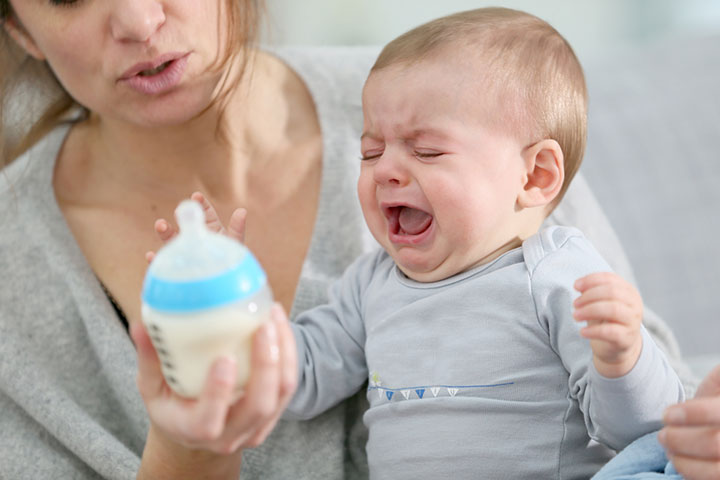
Image: Shutterstock
As a parent your number one concern is to keep your child healthy and happy. But this is easier said than done when you have a little one with an underdeveloped digestive system and a bad case of gas. Sometimes, it can get hard to distinguish between the two. Most parents often mistake a bad case of gas for colic. This is when a baby cries for a frequent, prolonged and intense period of time which can be particularly frustrating for parents when they cannot figure out what is wrong. But why do babies do this? It’s often due to their digestive system being underdeveloped. Maybe they are overfed or underfed. It could also be due to an unhealthy balance of bacteria in the digestive tract or food allergies that the parents were not aware of (1). Colic also begins suddenly, with a loud cry that doesn’t seem to end. And although these babies can be fussy, gassy and usually don’t sleep as well as their non-colic counterparts, they grow and gain weight normally (2). But how can you tell if your baby is truly colic or if they are just gassy that day? If you’d like to know more, read on!
How To Tell If Your Baby Is Gassy And What Causes It?
If your baby is displaying signs like arching their back, passing gas, and having sporadic crying episodes, it’s possible that they are experiencing a common issue known as baby gas. While this can be uncomfortable for your little one, there are simple and effective remedies to provide them with relief. It’s important to understand why your baby might be gassy in the first place. Baby gas is a frequent occurrence, even in healthy infants, primarily because babies tend to swallow excess air during activities such as crying, feeding, and sucking, which are typical during their early months. This air can become trapped in their system. Another contributing factor to baby gas can be an imbalance of beneficial bacteria in their gastrointestinal tract, which can lead to digestive issues. Such imbalances might result from antibiotic usage or a C-section delivery, which can limit your baby’s exposure to lactobacillus, a beneficial bacteria found in the vaginal canal.
How To Differentiate Between Baby Gas And Colic?
Baby colic and baby gas share a connection with digestive issues, but their distinction lies in the frequency of gas formation and its impact. If your baby experiences prolonged bouts of crying, lasting more than three hours at a stretch for over three consecutive days, and doesn’t respond to typical baby gas remedies, it’s more likely they have colic. However, if their crying is short-lived and subsides once the gas is released, it is indicative of a common case of baby gas.
How To Relieve Baby Gas?
1. Pick The Right Foods
This is particularly crucial when introducing solid foods into your baby’s diet. Pay close attention to foods that might exacerbate baby gas. If your little one lacks sufficient beneficial bacteria in their gut, they may struggle with digesting high-fructose fruits or starchy vegetables. It’s important to take note of this (3). You can opt for fruits with lower fructose content.
2. Breastfeed Your Baby
Breast milk plays a pivotal role in your baby’s development. However, there are additional reasons why choosing to breastfeed your baby, if possible, is beneficial. The proteins in breast milk are easier for your baby to digest in comparison to those in formula, which can help reduce the likelihood of baby gas. You can further enhance this by being mindful of your own diet, avoiding foods that might potentially cause gas, such as dairy products containing lactose. If you must resort to formula, consider selecting one that is gentle on your baby’s stomach.
Another factor to consider is bottle feeding. Irrespective of whether you use breastmilk or formula, bottle feeding can lead to your baby drinking milk much faster and swallowing more air in the process than they would have if they were breastfeeding. You can also make sure to burp your baby after every feed to ensure that they have digested their meal.
Making sure your baby is healthy and active at all times can be a taxing and tireless job. After all, anything can set them off and cause issues that keep you and your baby up throughout the night. Baby gas, however, does not have to be one of these things. Now that you know how to avoid it and help your baby through it, they will be right as rain in no time. Happy parenting!
















